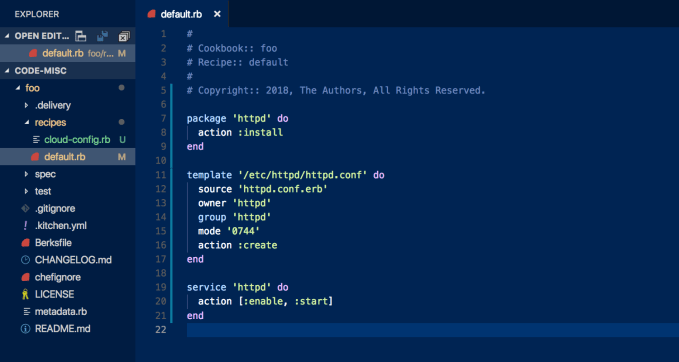Chef, the popular automation service, today announced that it is open-sourcing all of its software under the Apache 2 license. Until now, Chef used an open core model with a number of proprietary products that complemented its open-source tools. Most of these proprietary tools focused on enterprise users and their security and deployment needs. Now, all of these tools, which represent somewhere between a third and a half of Chef’s total code base, are open source, too.
“We’re moving away from our open core model,” Chef SVP of products and engineering Corey Scobie told me. “We’re now moving to exclusively open-source software development.”
He added that this also includes open product development. Going forward, the company plans to share far more details about its roadmap, feature backlogs and other product development details. All of Chef’s commercial offerings will also be built from the same open-source code that everybody now has access to.
 Scobie noted there are a number of reasons why the company is doing this. He believes, for example, that the best way to build software is to collaborate in public with those who are actually using it.
Scobie noted there are a number of reasons why the company is doing this. He believes, for example, that the best way to build software is to collaborate in public with those who are actually using it.
“With that philosophy in mind, it was really easy to justify how we’d take the remainder of the software that we produce and make it open source,” Scobie said. “We believe that that’s the best way to build software that works for people — real people in the real world.”
Another reason, Scobie said, is that it was becoming increasingly difficult for Chef to explain which parts of the software were open source and which were not. “We wanted to make that conversation easier, to be perfectly honest.”
Chef’s decision comes during a bit of a tumultuous time in the open-source world. A number of companies like Redis, MongoDB and Elastic have recently moved to licenses that explicitly disallow the commercial use of their open-source products by large cloud vendors like AWS unless they also buy a commercial license.
But here is Chef, open-sourcing everything. Chef co-founder and board member Adam Jacob doesn’t think that’s a problem. “In the open core model, you’re saying that the value is in this proprietary sliver. The part you pay me for is this sliver of its value. And I think that’s incorrect,” he said. “I think, in fact, the value was always in the totality of the product.”
Jacob also argues that those companies that are moving to these new, more restrictive licenses, are only hurting themselves. “It turns out that the product was what mattered in the first place,” he said. “They continue to produce great enterprise software for their customers and their customers continue to be happy and continue to buy it, which is what they always would’ve done.” He also noted that he doesn’t think AWS will ever be better at running Elasticsearch than Elastic or, for that matter, at running Chef better than Chef.
It’s worth noting that Chef also today announced the launch of its Enterprise Automation Stack, which brings together under a unified umbrella all of Chef’s tools (Chef Automate, Infra, InSpec, Habitat and Workstation).
“Chef is fully committed to enabling organizations to eliminate friction across the lifecycle of all of their applications, ensuring that, whether they build their solutions from our open-source code or license our commercial distribution, they can benefit from collaboration as code,” said Chef CEO Barry Crist. “Chef Enterprise Automation Stack lets teams establish and maintain a consistent path to production for any application, in order to increase velocity and improve efficiency, so deployment and updates of mission-critical software become easier, move faster and work flawlessly.”
